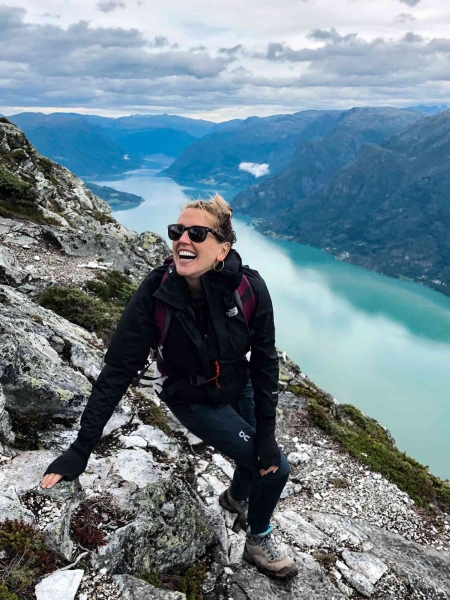The case for radical self-acceptance.
I’ve been going through in vitro fertilization for the past two and a half years, and a few months ago, a friend of mine in a similar boat told me she was mad at herself for not “starting to try” sooner. “If I’d gotten on the ball earlier, I might not be in this situation now,” she lamented. “I really regret not starting when I was younger—don’t you?”
My husband Rahul and I began IVF when I was 36 years old, after many months of trying (and failing) to conceive naturally. I just turned 39, and it still hasn’t worked for us. I’ve endured five egg retrievals and three failed embryo transfers since we began, as well as a laparoscopic surgery to diagnose, and then remove, endometriosis. The whole ordeal has been incredibly difficult, impacting every facet of my life in ways I’m certain I’ve yet to fully understand.

So you’d think that, like my friend, I’d regret not starting the process years earlier. The A to her Q seems like it’d be an obvious yes, not least because deep and persistent remorse is a common sentiment throughout the IVF community. But perhaps surprisingly, I actually don’t regret my choices. I used to and, of course, still have my fair share of intrusive “if only” thoughts, but I’ve recently come to recognize them as just that: thoughts. And it turns out, a certain friendship-bracelet-wearing, billionaire global pop star has helped shift my thinking and propel me to this place of inner peace.
Understand: I’m not a certified Swiftie. I am not one of those fans who knows how to decode Taylor Swift’s songs or find clues in her outfits. But I am a consumer of pop culture, and I do admire her as a songwriter and businesswoman, and so—much like the rest of the world—I spent a good chunk of 2023 casually taking in Swift content without even realizing I was doing it. (Perhaps you heard about her ability to shift the global economy through her Eras tour and her relationship with a Super Bowl–winning tight end, too?)
For the uninitiated, Swift’s concert is a journey through her different musical “eras,” from her first self-titled album in 2006 to her most recent one, Midnights, released in 2022. By honoring each and every album of her career thus far, even the ones that were not critically acclaimed, Swift is sending a clear and important message to the world: Everything you’ve ever done is part of your story. Even the cringe parts. Maybe especially the cringe parts. Rather than wincing at our past selves, she seems to ask, What if we embraced them? What if we stopped regretting what we did and who we used to be and instead celebrated our past selves—our past eras—for who we were at that time? In her December 2023 TIME magazine Person of the Year profile, written by Sam Lansky, she explains her philosophy of “radical self-acceptance” (Lansky’s term) perfectly: “Every part of you that you’ve ever been, every phase you’ve ever gone through, was you working it out in that moment with the information you had available to you at the time…You should celebrate who you are now, where you’re going, and where you’ve been.”

It was the year-end advice I needed to hear. Simply put, 2022 and 2023 were the darkest times of my life. I alternated between hope, despair, regret, and jealous rage on a daily basis (happy for you, friends who are pregnant, but also why not me?). When I read that quote, though, something shifted. I was inspired to look at my past in a new, kinder-to-myself light and embrace the previous decisions that led me here—regardless of my current struggle.
My husband and I did not take family planning lightly. We got married just before I turned 34 and very intentionally chose to not try for kids right away. We didn’t want them yet; we were both excited and passionate about our careers, and wanted to accomplish a few key things before we started the parenthood chapter. For Rahul, that meant continuing to grow his business, Heady, a digital product consultancy with offices in both New York and Mumbai. For me, that meant writing books. I have always wanted to write books. I got my first job as an editorial assistant at a national magazine when I was 22, and worked my way up the editorial ladder, hoping it’d be my ticket to authorland. I saw more experienced editors who’d built up bodies of work and then pitched book ideas based on that, and thought: I want to do that, too. And so I did. Right around the time Rahul and I got married, I started working on a proposal for my first book, Destination Wellness, which is a combination of my two specialties: travel and health. I’d become disillusioned with the commercialized, Goop-y wellness industry, and my idea was to travel the world exploring more genuine ways to live a healthy life.
I knew the execution of this idea would require tons of travel and years of work. I also knew that would need to occur during prime baby-making years. But I was all in. This was my moment, Rahul and I agreed, a time when I could fully devote myself to my dreams without factoring in the logistics of parenthood. I’d spent more than a decade in New York carefully building a career that could lead to this outcome, and I did not want to squander the opportunity when it was finally within reach. Plus, I wanted to have a book under my belt before I became a mother—I figured there’d be time to do both.
I spent my 34th year visiting Japan, India, Jamaica, Norway, Hawai’i, and Brazil, which led to some of the most enriching, soul-stirring experiences of my life. I got back from my last reporting trip just weeks before Covid-19 grounded the globe in 2020, and spent all of lockdown writing and editing. By the time Destination Wellness came out in May 2021, I was 36.

Here is where everything gets murky: I have plenty of friends who became pregnant with their first kid around age 36, and are now closing in on their second pregnancies before 40, no existential crisis included. But because I now know, after more than two years in infertility limbo, that I have a low ovarian reserve, a thin uterine lining, mild endometriosis, and an autoimmune system that possibly attacks our embryos—all issues that make it difficult but not impossible to get pregnant—it’s been all too easy to backtrack and question decisions that I was so proud of before. If I'd gotten myself tested earlier and therefore known I would have these issues, would the outcome have been different? If I hadn't been so ambitious, if I hadn't spent so long in my “book era,” would IVF have worked for me and my husband?
It’s impossible to know. If I had to guess, I’d say this was always going to be my fate, as a low ovarian reserve and mild endometriosis and high autoimmune response are lifelong conditions. But the point here—the one that brings me back to Taylor Swift—is that these questions are futile in the first place.
When you’re struggling with infertility, it’s hard not to look back on your life through your current lens and blame yourself for making “bad” choices that led you to this painful place. But I keep reminding myself: I didn’t know I was infertile before all of this. I didn’t have this information back then. I didn’t want kids earlier. I was simply making the best decisions I could with the information available to me at the time.
And now, much like Swift on her tour, I’m making a new point to honor that past version of me—the one who took a chance on herself and went for it. I’m still incredibly grateful I wrote Destination Wellness when I did. That entire experience, from the lovely people I met on my travels to the satisfaction of holding my book in my hands for the first time, continues to be one of the great gifts and joys of my life. If anything, knowing I have that accomplishment to build on has made it easier to navigate the career challenges that have inevitably arisen from this grueling IVF process. Thanks to endless doctor’s appointments that require my presence, I’m now a travel writer who, ironically, is often at home. But I feel confident that I’ve established enough of a track record that I’ll be able to return to more consistent globetrotting when I can—hopefully with a baby in tow. And in the meantime, I’ll continue to live my life on my own timeline (Annie’s version).
